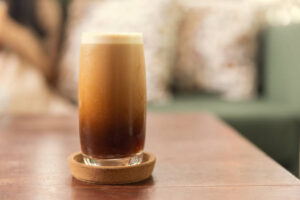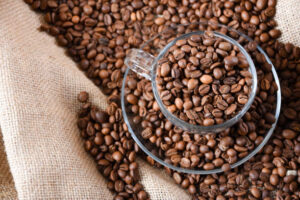Coffee lovers are always on the quest for the perfect brew. From choosing the right beans to mastering the brewing technique, every detail matters. One common question that arises is whether distilled water can be used for coffee. Let’s explore this topic to see if distilled water is the key to unlocking the perfect cup of coffee.
Why Water Quality Matters in Coffee Brewing
Water makes up about 98% of your coffee. Therefore, its quality significantly impacts the flavor and overall experience of your brew. Poor water quality can ruin even the best coffee beans, while excellent water can elevate your brew to new heights. This makes understanding the role of water in coffee essential.
What is Distilled Water?
Distilled water is water that has been boiled into steam and condensed back into liquid in a separate container. This process removes impurities and minerals, resulting in ultra-pure water. It’s commonly used in laboratories and medical facilities but is it suitable for brewing coffee?
The Science Behind Coffee and Water
Coffee brewing is a complex chemical process. The water extracts flavors, oils, and caffeine from coffee grounds. Minerals in water, like calcium and magnesium, play a crucial role in this extraction. They help balance the flavors, making your coffee taste better. Without these minerals, the extraction process can be incomplete or imbalanced.
Can You Use Distilled Water for Coffee?
Using distilled water in coffee is a controversial topic among baristas and coffee aficionados. Some argue that the lack of minerals in distilled water leads to flat, lifeless coffee. Others believe that its purity allows the true flavors of the coffee beans to shine. The truth lies somewhere in between and depends on your personal preference and the type of coffee you’re brewing.
Pros of Using Distilled Water for Coffee
- Consistency: Distilled water provides a consistent base for brewing. This can be especially useful when experimenting with different beans and techniques.
- Purity: The absence of impurities means no unwanted flavors or odors in your coffee.
- Equipment Longevity: Without minerals, there’s less chance of scale build-up in your coffee maker, which can prolong its lifespan.
Cons of Using Distilled Water for Coffee
- Flat Taste: The lack of minerals can result in a flat and uninteresting cup of coffee.
- Incomplete Extraction: Essential minerals aid in the extraction process. Their absence can lead to an under-extracted brew.
- Cost: Distilled water can be more expensive and less convenient than regular tap water.
Comparing Distilled Water with Tap and Filtered Water
To understand if distilled water is suitable for coffee, it’s crucial to compare it with other types of water. Tap water varies significantly in quality, depending on your location. It may contain chlorine, fluoride, and other chemicals that can affect your brew’s taste. However, it also contains minerals that are beneficial for coffee extraction.
Filtered water lies somewhere between tap and distilled water. It removes unwanted chemicals while retaining essential minerals. This makes it a popular choice among coffee enthusiasts.
How to Test Your Water Quality
Before deciding on the best water for your coffee, it’s helpful to test your current water quality. You can purchase a simple water testing kit to measure pH levels, hardness, and other factors. This will give you a clearer understanding of what’s in your water and how it might affect your coffee.
The Role of Mineral Content in Coffee
Mineral content, particularly calcium and magnesium, plays a significant role in coffee brewing. These minerals enhance flavor extraction and balance acidity. Water that’s too hard (high in minerals) can lead to over-extraction, making your coffee taste bitter. On the other hand, water that’s too soft (low in minerals) can result in under-extraction, causing a bland taste.
Best Practices for Using Water in Coffee Brewing
Regardless of the type of water you choose, following best practices can improve your coffee brewing experience:
- Consistent Temperature: Use water that’s around 195-205°F (90-96°C) for optimal extraction.
- Proper Ratio: Stick to the recommended coffee-to-water ratio (usually 1 to 2 tablespoons of coffee per 6 ounces of water).
- Clean Equipment: Regularly clean your coffee maker to prevent any build-up of impurities or old coffee oils.
Expert Opinions on Using Distilled Water
Coffee experts and professional baristas often prefer filtered water over distilled for brewing. They believe that the right balance of minerals is essential for a well-rounded cup of coffee. However, they also acknowledge that distilled water can be a good option in areas with poor tap water quality.
Personal Preferences and Experimentation
Ultimately, the best water for your coffee depends on personal preference. Experimenting with different types of water can lead you to discover what you enjoy most. Try brewing with distilled, tap, and filtered water to see which produces the best results for you.
Conclusion
While distilled water can be used for coffee, it may not provide the best flavor due to the lack of essential minerals. Filtered water, which retains these minerals while removing impurities, is often the preferred choice among coffee lovers. However, personal preference plays a significant role, and experimenting with different water types can help you find the perfect balance for your brew.
FAQs
1. Is distilled water safe for drinking and brewing coffee?
Yes, distilled water is safe for drinking and brewing coffee. However, it lacks the minerals that contribute to the flavor and extraction process in coffee brewing.
2. Can distilled water damage my coffee maker?
No, distilled water won’t damage your coffee maker. In fact, it can help prevent scale build-up, prolonging the life of your machine.
3. What is the best type of water for coffee?
The best type of water for coffee is typically filtered water. It removes unwanted chemicals and impurities while retaining beneficial minerals that enhance flavor extraction.






